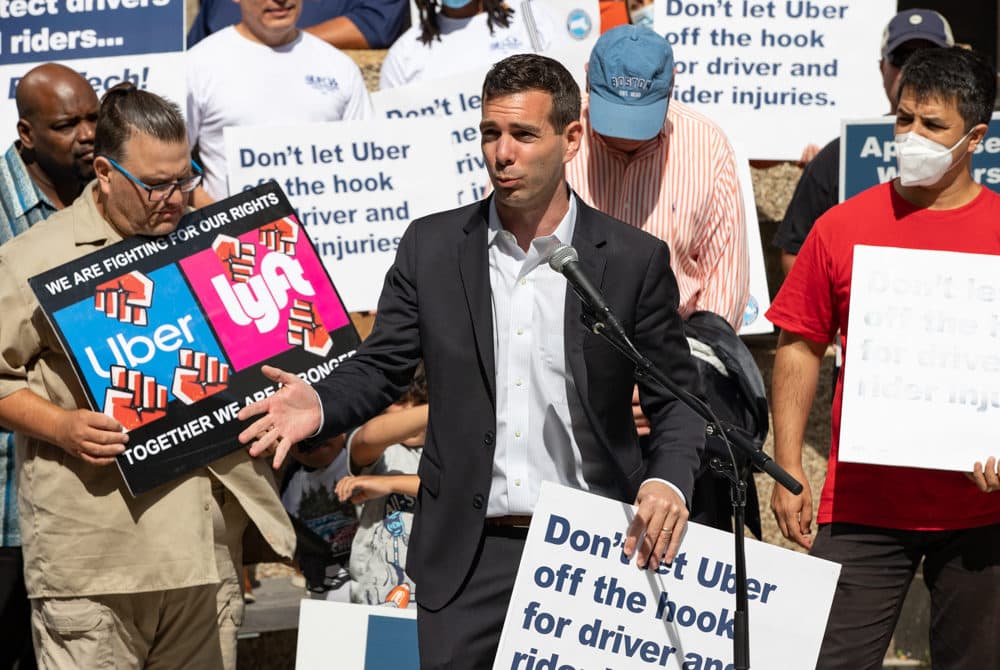Advertisement
Opponents Call for Healey to Strike Driver Ballot Question

Opponents of a ballot question that would overhaul worker status and benefits for app-based drivers have urged Attorney General Maura Healey to declare the proposal invalid, while supporters on Tuesday filed a new complaint with campaign finance regulators.
In the latest volleys of an already contentious campaign, both the industry-backed coalition seeking a new landscape for app-based drivers and the labor-backed coalition that wants gig economy companies to work within existing state law asked state agencies to intervene.
The Coalition to Protect Workers' Rights, which is fighting the ballot question, published a memorandum on Tuesday that it sent to Healey calling on her to deem the proposal unconstitutional, alleging it improperly mixes multiple topics in an argument that the petition's backers called "outlandish."
Both versions of the ballot question awaiting Healey's review include language that would declare all app-based drivers to be independent contractors instead of employees, offer drivers some access to benefits such as paid sick leave, and outline occupational accident insurance requirements.
Opponents, who include groups such as the Massachusetts AFL-CIO and the ACLU of Massachusetts, alleged that the combination of issues fails to meet a "relatedness" requirement that all initiative petitions must clear and could "confuse and mislead voters."
"The Petitions are misleading because they suggest that voters who support increased protections and benefits for app-based drivers must also agree that these drivers be classified as independent contractors before they can obtain such protections," they wrote to Healey's office. "But of course, a voter may want app-based drivers to obtain benefits and protections, without knowing that app-based drivers should be (but are not) currently benefitting from statutory employment protections that far exceed the Petitions' regulatory proposals."
Coalition to Protect Workers' Rights officials also told Healey's office that one section of the ballot question would function as a "liability shield." In a statement provided by the opposition campaign, consumer rights attorney Gary Klein said that inclusion shows that "gig companies are attempting to escape basic responsibility and accountability to customers and the public, and reducing their incentives to make their services safer."
Supporters of the question, backed by Uber, Lyft, DoorDash and Instacart, fired back that the memo to Healey was based on "outlandish claims."
"Given that drivers support the ballot question by a margin of seven to one, it's no surprise that opponents of driver independence want to distract from this fact by making outlandish claims that do not hold up to scrutiny, all to block voters from having their say," said Conor Yunits, a spokesperson for the Coalition for Independent Work, which proposed the ballot question.
"This ballot question raises the standard for the industry by mandating public safety training for drivers, and it adds occupational accident insurance to the $1 million commercial auto liability insurance that Massachusetts law already requires for app-based rideshare companies," Yunits added.
Healey is reviewing the dozens of initiative petitions filed in the current cycle and plans to announce by Sept. 1 which ones she has certified as meeting constitutional requirements.
The certification process focuses only on a set of constitutional requirements and not on the attorney general's opinion about the merits of an issue.
Separately, Healey is suing Uber and Lyft over allegations that their practice of designating drivers as independent contractors violates state wage and hour laws.
Members of the Coalition to Protect Workers' Rights unveiled their calls for the attorney general to spike the question at a Tuesday morning outside One Ashburton Place in Boston, where Healey's office is located.
Hours earlier, the Coalition for Independent Work submitted a formal complaint to the state Office of Campaign and Political Finance, asking the regulatory agency to investigate ballot question opponents over allegations that they received contributions and made expenditures on their campaign before officially forming a political finance committee.
OCPF records show the Coalition to Protect Workers' Rights submitted a statement of organization for a ballot question committee on Aug. 3. On Aug. 6, the committee submitted an initial report disclosing $464,500 in receipts and $43,067.10 in expenditures between June 11 and Aug. 4.
"Checking a box on (the organization of committee form) does not excuse the obvious fact that CPWR raised and expended funds without having taken the steps to permit it to do so," Josh Gold, a member of the Coalition for Independent Work, wrote in his complaint to OCPF.
Last week, opposition campaign leader Mike Firestone filed a complaint with OCPF alleging that the Coalition for Independent Work had raised and spent money on consultants, campaign materials, and advertising before it announced its plans to pursue a ballot question and convened a committee.
As of Tuesday afternoon, OCPF's database showed no fundraising or spending disclosures for the Coalition for Independent Work's ballot question committee.
"Retaliation by these Big Tech companies is not a surprise," Firestone said in a statement replying to the complaint ballot question supporters filed. "We are a coalition supported by working people and anyone can see our full disclosures online. By contrast, the Uber/Big Tech lobbying group has disclosed zero ($0) in campaign contributions or spending in what is widely expected to be the most expensive ballot campaign in state history, continuing a pattern of blatant disregard for state laws."